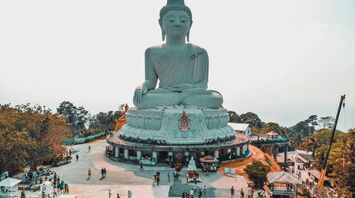Pearls, Peranakan Culture, and Rare Rituals: Discovering the Hidden Side of Phuket

Phuket isn’t just about beaches and luxury resorts. The island offers a rich tapestry of cultural experiences, from the annual vegetarian festival to the vibrant Peranakan heritage, providing a deeper connection to its historical roots.
In the early morning light, Jui Tui, a Chinese shrine in Phuket's Old Town, is bustling with activity. Devotees gather under canopies, surrounded by eclectic religious statues. The heady scent of incense fills the air as the island prepares for the Phuket Vegetarian Festival. This nine-day event, known for its intense rituals and meat-free food, dates back 200 years to an opera troupe from China’s Fujian province.
Jo Lecourt, a local guide, navigates through the procession where participants undergo extreme body piercings without flinching. The mah song, or spirit mediums, are central to the festival. One such medium, Pai Siripohn, shares her experiences in a post-procession interview. Possessed by a protective goddess, Pai performs these rituals in a trance, feeling no pain.
Exploring Phuket’s Old Town reveals its Peranakan heritage, a blend of Chinese and local cultures. Chanachon Tandavanitj, a descendant of Chinese settlers, showcases his ancestral home, Chinpracha House, filled with artifacts reflecting the island's diverse cultural influences.
A visit to Blue Elephant, a renowned restaurant, offers a culinary journey into Phuketian cuisine. Chef Nooror Somany Steppe teaches traditional dishes, highlighting the unique blend of Thai, Malay, and Chinese flavors that define the island's gastronomy.
On the quieter east coast, away from the tourist hotspots, lies the traditional life of the chao leh, or sea gypsies. Visiting a pearl farm, I learn about the local pearl industry and the significance of pearls in Thai culture.
Phuket’s rich traditions and cultural heritage provide a fascinating contrast to its modern tourist attractions, offering a unique and enriching experience.



















